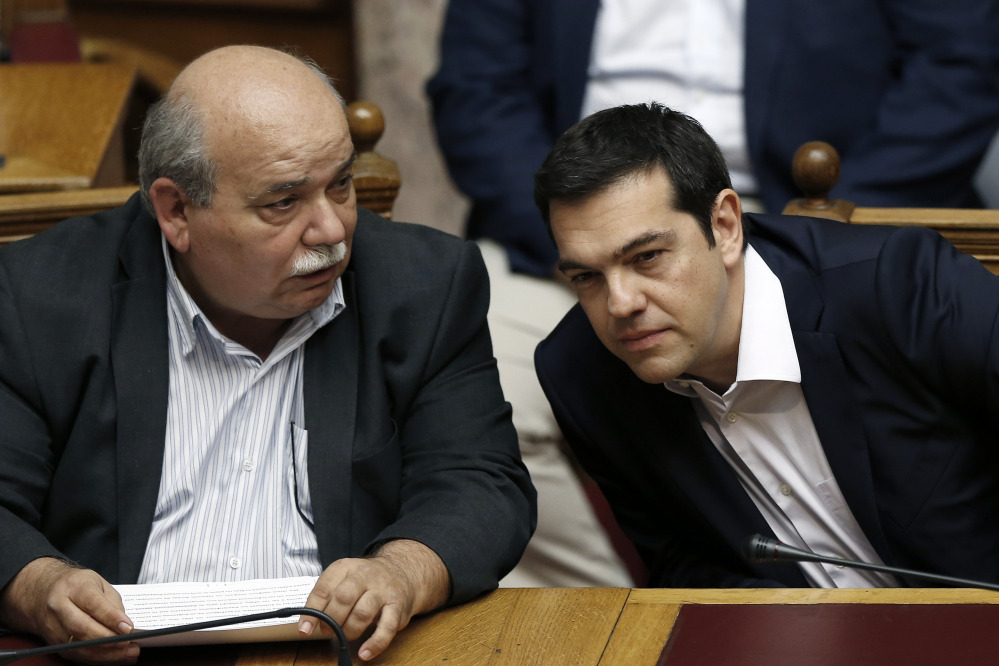BRUSSELS – Greece is one big step closer to falling out of the euro currency union after its fellow member states refused to extend its bailout program past Tuesday, leaving the country on the brink of financial chaos.
After five months of fruitless negotiations, relations between Greece and its creditors crumbled further Saturday after Prime Minister Alexis Tsipras stunned them by calling for a referendum on the proposed reforms needed to get bailout loans.
The radical left-wing leader accused the creditors of using blackmail and ultimatums against his proud but struggling people. European officials called his move for a vote a foolish and rash gambit that effectively ended negotiations to keep Greece financially afloat.
In the streets of Greece, worried people queued outside banks for cash from dawn to dusk amid the uncertainty, after billions of euros had already been emptied in the preceding weeks.
Greece has a 1.6 billion euro ($1.8 billion) debt due on Tuesday and its bailout program expires the same day, after which it is unclear how the country might survive financially.
Greek Finance Minister Yanis Varoufakis left a eurozone finance ministers’ meeting after his request for a one-month extension to the bailout program had been refused. The other 18 finance ministers then huddled without him to assess how to minimize the damage from the Greek crisis on their currency.
“Our institutions are and will be prepared to take any action if needed,” said top eurozone official Jeroen Dijsselbloem of fears that financial turbulence might extend to the rest of the currency bloc. Fellow ministers spoke candidly about the risks of a Greek exit from the euro in a way that would have been inconceivable only weeks ago.
The ministers stressed Greece remained in the eurozone for now, and Dijsselbloem said “the eurogroup stands ready to reconvene to take appropriate decisions where needed, in the interest of Greece as euro area member.”
With high anxiety gripping Greece, parliament prepared for a vote on its July 5 referendum round midnight, 24 hours after Tsipras surprised just about everyone by announcing the vote.
Without a bailout program extension or more loans from creditors, Greece is likely to be in arrears on a debt payment due the same day. Its banks face the risk of collapse.
“The Greek authorities have asked for a month extension. But in that month there can be no disbursements,” he said. “How does the Greek government think that it will survive and deal with its problems in that period? I do not know,” Dijsselbloem said.
Upon leaving while his counterparts continued talks, Varourfakis said “it’s a sad day for Europe but we will overcome it.”
France’s finance minister, Michel Sapin, stressed that a deal was still possible and that he was ready to act as a go-between among Greece and the creditors after relations neared a breaking point.
Dijsselbloem refused to slam the door full shut. “The door is open. It was not the institutions that walked away from the last talks last night.”
Now much will depend on whether the European Central Bank will accept to continue to prop up Greek banks even after the country’s bailout program expires. It would be under huge pressure to stop using eurozone taxpayer money to keep alive the banks if there is no prospect for a deal.
The eurozone finance ministers suggested Greece should take steps to stabilize its financial system – code for putting limits on cash withdrawals and money transfers.
If Greece’s banks collapse, the Greek government would have to support them itself. Penniless, the government would have to revert to printing a new currency, effectively drawing the country out of the euro union.
The governing council of the ECB will meet “in due course” to assess the situation, most likely Sunday, officials said.
The Greek government said it would recommend Greeks vote “no” in the referendum, but Varoufakis noted “the high possibility that the Greek people will vote against the advice of the Greek government.”
What would happen in that case – whether Greece would have to leave the euro or try to renegotiate more time with creditors – is unclear.
An exit from the euro would put Greece through a new era of economic pain. With the new currency less valuable than the euro, the government would have to write off a chunk of its foreign loans – mainly owed to eurozone countries – and many companies and households would go bankrupt. Experts predict a long and deep recession in a country that has already been through five years economic depression.
The uncertainties of all this would roil European and global markets, though experts are divided on the extent. Some say Europe is better equipped to handle a Greek euro exit, but others say it is unclear what might happen. The euro dropped in value slightly on international markets after the referendum was called.
Thanassis Stavrakis and Paris Ayiomamitis in Athens, Greece, and Derek Gatopoulos and Lorne Cook in Brussels contributed to this report.
Send questions/comments to the editors.



Success. Please wait for the page to reload. If the page does not reload within 5 seconds, please refresh the page.
Enter your email and password to access comments.
Hi, to comment on stories you must . This profile is in addition to your subscription and website login.
Already have a commenting profile? .
Invalid username/password.
Please check your email to confirm and complete your registration.
Only subscribers are eligible to post comments. Please subscribe or login first for digital access. Here’s why.
Use the form below to reset your password. When you've submitted your account email, we will send an email with a reset code.